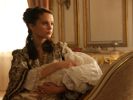Eye For Film >> Movies >> A Royal Affair (2012) Film Review
A Royal Affair
Reviewed by: Jennie Kermode

In the middle of the 18th Century, a journey to Denmark was, for most western Europeans, like a journey back in time. Still stubbornly resisting the Enlightenment, the country was politically dominated by its priests, closely allied with powerful landowners who also legally owned most of its population. At the top of their hierarchy sat a mentally fragile king, Christian VII. He wasn't difficult to keep in line. Nobody could have guessed that the arrival of two apparently trivial figures - a 15 year old English princess meant to give him an heir and an undistinguished German doctor meant to calm his wild mood swings - would dramatically change that.
A Royal Affair opens with the princess, Caroline (Alicia Vikander) arriving in her new home, full of hope. It doesn't take long for this to be shattered. From the rats in the streets, to the confiscation of her books, to her new husband's rudeness and bizarre squeaky laugh (which recalls Tom Hulce in Amadeus), everything is a disappointment. Christian (Mikkel Følsgaard) is himself bitterly disappointed in her. Why can't she be more fun? So he asks his new physician and friend, Struensee (Mads Mikkelsen) to find a way of cheering her up. His choice couldn't be more astute. Its consequences, however, will destroy them all.

Based though it is on real events, this could easily seem like a formulaic costume romance. It has the corsets, the sighing, the wild horse rides, the secret liaisons and the nervous chamber maids. But the historical reality was as much about political as personal liberty, and the film reflects that. Notably, it presents the initial attraction between Caroline and Struensee as an intellectual one. She doesn't like him until she discovers a forbidden volume hidden in his library. Snatching moments together at balls and on balconies, they discuss Voltaire. As whispers become kisses, books become pamphlets, then gatherings of free thinkers. Then Caroline, seeing they have no direct power to effect social change, says "Why don't we use the king?"
It is here that the film really comes together as something altogether more sophisticated than the average romance. Christian is presented as neither a monster nor a fool, simply as somebody struggling with the consequences of a poor education and then untreatable mental health problem. In his moments of lucidity he someimes proves the shrewdest of the three. Acutely aware as he is, then, of his own condition, it would seem that he in turn is using Struensee and Caroline, needing their help to overcome his difficulties and push a reformist agenda that he too believes in. With an antagonistic stepmother and little evidence of affection from anyone else, he also seems to look to his wife as a mother figure, whilst it gradually becomes clear that he feels an intense love for Struensee - perhaps reciprocated - which would bind the three of them in mutual dependency even if there were no kingdom at stake. It is in depicting the social constraints that suffocate the joy in this that the film is at its most directly political.
The complicated relationship is handled with great sensitivity and Følsgaard succeeds in attracting real sympathy to an extremely challenging character. He is well balanced by the ever dependable Mikkelsen, who effectively brings out the naivete and the intellectual limits of Struensee during an ill-judged rapid rise to power. Vikander is the weakest of the three, struggling in early scenes where the script doesn't give her much room to move. She never quite conveys the intellectual brilliance necessary to make Struensee's ongoing attraction convincing, but towards the end she finally gets some opportunity to show her emotional range.
As a historical account, this tale is necessarily abridged. The impending Napoleonic wars become invisible and Christian's passion for science is unfortunately elided, so we lose sight of his few lasting achievements. But as an insight into the development of modern Denmark - and Europe more widely - it has much to commend it. And for those who are on the lookout for romance, it won't disappoint.
Reviewed on: 14 Dec 2012


















